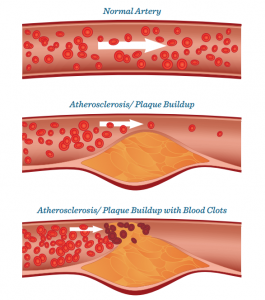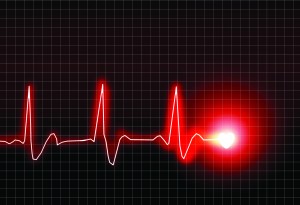
Measure Up/Pressure Down® Campaign – Circulation Nation booklet & Choose Your Path video
Blood pressure is the measurement of how hard it is for your blood to push against the walls of your blood vessels as it moves through your body. The higher the pressure, the harder your heart has to work. It’s perfectly normal for your blood pressure to rise and fall throughout the day, depending on your activity level and stress. Exercise, winning the lottery and nearly getting hit by a bus will all increase your blood pressure, however it should return to its normal rate after you have had a chance to catch your breath.
At least a quarter of American men have blood pressure that stays high all the time—and that’s a dangerous problem. High blood pressure puts a strain on your heart and blood vessels and increases the risk of damage to your heart, eyes, kidneys and other organs, and increases the risk of having a heart attack or a stroke.
The good news is that high blood pressure can usually be successfully treated. The bad news is that because high blood pressure has no obvious symptoms; people can have it for years without knowing, which is why it’s often called “the silent killer.” High blood pressure can result from taking certain prescription medications or by a chronic medical condition. However, in the majority of cases the cause of high blood pressure is still a mystery.
About
Blood pressure readings are given as two numbers, for example, 110/80 (pronounced “one-ten over eighty”).
- The top number (called systolic) is the pressure of the blood flowing through your arteries when your heart beats.
- The bottom number (called diastolic) is the pressure of the blood in the arteries between beats, when the heart is resting.
Your healthcare provider or healthcare provider will tell you whether your blood pressure is too high. But you should also know what readings are normal and what aren’t. Unless your healthcare provider tells you otherwise, use the chart below.
Categories for Blood Pressure Levels in Adults (measured in mmHg)
|
Category
|
Systolic
|
|
Diastolic
|
| Normal |
Less than 120
|
And
|
Less than 80
|
| Prehypertension (means start making changes to your lifestyle to avoid hypertension) |
120–139
|
Or
|
80–89
|
| High blood pressure |
|
|
|
| Stage 1 |
140–159
|
Or
|
90–99
|
| Stage 2 ( very high) |
160 or higher
|
Or
|
100 or higher
|
If you have diabetes or chronic kidney disease, the target blood pressure after taking medication is 130/80 mmHg or below.
RISK FACTORS
The risk factors for high blood pressure are:
- You were previously diagnosed with high blood pressure
- An immediate family member was diagnosed with hypertension or some other kind of heart condition before age 55
- You are African-American
- You get little or no exercise
- You are obese
- You eat a diet high in salt
- You have high cholesterol
- You smoke. If you do, you are 2-4 times more likely to develop heart disease than a nonsmoker.
- You’re under a lot of stress
- You have more than 2 alcoholic drinks every day
- You drink a lot of coffee (not decaf)
- You have diabetes. More than 80% of people with diabetes die of some kind of cardiovascular disease
- You’re taking medication that affects blood pressure. These include Ritalin (for ADD), steroids, migraine medications, any over-the-counter drugs that contain pseudoephedrine, and any medication that contains stimulants such as caffeine
- You’re 45 years or older
Challenges in Sexual Health
Although sexual activity is unlikely to pose an immediate threat to your health — such as a heart attack — high blood pressure can affect your overall sexual satisfaction.
Over time, high blood pressure damages the lining of blood vessels and causes arteries to harden and narrow (atherosclerosis), limiting blood flow. This means less blood is able to flow to the penis. For some men, the decreased blood flow makes it difficult to achieve and maintain erections — often referred to as erectile dysfunction which is a fairly common problem shared by many men.
Even a single episode of erectile dysfunction can cause anxiety. Fears that it will happen again might lead men to avoid sex — and affect the relationship with their sexual partner. High blood pressure can also interfere with ejaculation and reduce sexual desire.
High blood pressure medications that can cause sexual dysfunction as a side effect include:
- Water pills (diuretics). Diuretics can decrease forceful blood flow to the penis, making it difficult to achieve an erection. They can also deplete the body of zinc, which is necessary to make the sex hormone testosterone.
- Beta blockers. These medications can affect the nervous system reaction that causes an erection. Beta blockers can also make it difficult for the arteries in the penis to widen (dilate) to let in enough blood flow to cause an erection.
To reduce the risk of side effects from these medications, including sexual problems, take medications exactly as prescribed. If you still have side effects, consult with your healthcare provider about other possible medications that may have fewer side effects.
FYI
The CDC estimates that about 1 in 3 U.S. adults—or 67 million people—have high blood pressure. Only about half (47%) of people with high blood pressure have their condition under control.
They also say that women are about as likely as men to develop high blood pressure during their lifetimes. However, for people under 45 years old, the condition affects more men than women. For people 65 years and older, it affects more women than men.
Nutritional tips for High Blood Pressure and Cardiovascular Disease
- Eat at least 3 ounces of whole grain cereals such as whole wheat, oats, and brown rice per day. Whole grains provide abundant amounts of antioxidants, vitamins, minerals and fiber which are heart healthy.
- Eat plenty of fruits and vegetables as they are rich in antioxidants and vitamins, which reduce the risk of developing high blood pressure and heart diseases.
- Limit your sodium intake to 2300 mg/day. Too much sodium can cause high blood pressure.
- Use less oil, margarine, mayonnaise and salad dressings.
- When using oils choose olive , canola or nut which contain mono-unsaturated fats. Avoid saturated fats such as bacon fat, cream cheese, lard, coconut oil or chocolate.
- Low-fat or reduced fat dairy products will help to reduce your cholesterol levels. Too much cholesterol can lead to heart disease.
- When snacking, choose pretzels, popcorn or rice cakes instead of cookies, chips and cakes.
Prevention
Risk factors such as age and ethnicity cannot be changed. However, by making the following lifestyle changes, you may be able to prevent high blood pressure.
- Watch your weight. If you’re overweight, talk to your healthcare provider about the best ways to lose those extra pounds. As your weight increases, so does your blood pressure—and losing weight will have an immediate, positive effect. In addition, if you carry your weight around your middle/abdomen, you have a higher risk of having high blood pressure than if you carry it around the hips and thighs.
- Get plenty of exercise. Thirty minutes every day is ideal and cuts your risk of developing high blood pressure by 25-50%. And remember, it doesn’t have to be all at the same time. Taking the stairs instead of the elevator, dancing, playing sports, or even doing yard work all count. A minute here, a minute there, and you’re up to 30 before you know it.
- Cut back on salt and sodium. Read the labels on the products you buy and look for ones that are “sodium free” or “reduced sodium.” And start adding less salt to foods you prepare.
- Eat right. Get more nuts, fruits, vegetables, whole grains, fiber, and low-fat or fat-free dairy products. For protein, go for lean meats, fish, and beans. Cut back on sugar, and stay away from foods that have saturated fats, trans fats, and cholesterol.
- Quit smoking. If you don’t smoke but you live in a home where someone else does, encourage him or her to quit.
- Watch what you drink. You should have no more than 2 alcoholic drinks per day (if you’re not a drinker, don’t start unless your healthcare provider advises you to) and don’t drink more than 2 caffeinated beverages per day.
- Have regular physical exams. Make sure to tell your healthcare provider about all symptoms—even ones that might not seem like they have anything to do with your heart at all. For example, erectile problems and depression can be associated with cardiovascular disease.
- Get your blood pressure checked regularly. Keep track of how/whether it changes over time. To make sure your blood pressure remains within a safe range, you may need frequent blood pressure readings. Sometimes this can be done with a home blood pressure monitoring device or at your local drug/health store.
- Relax. Research has shown that petting animals, and even looking at fish in an aquarium lowers blood pressure. Meditation is also successful in reducing blood pressure. Reading is relaxing, so make a trip to the library for some immediate stress relief.
Diagnosis
Diagnosing high blood pressure is easy—get it checked regularly. However, because men are less likely than women to visit their health care providers, they’re also less likely to know their blood pressure levels.
In some patients, high blood pressure is related to other medical problems or can be a side effect of certain drugs. This form of the disease is called secondary hypertension, because it happens secondary to other medical conditions.
Questions to Ask Your Health Care Provider
- What do my blood pressure numbers mean?
- What should my blood pressure be?
- How can I control high blood pressure?
- How often should my blood pressure be checked? Can I do this at home?
- What kind of medicine do you recommend? What are the side effects and benefits?
- How do I know if it’s working?
- What do I do if I forget to take my medicine?
- What dietary and lifestyle changes can I take to control my blood pressure?
Treatments
If diagnosed with high blood pressure, there is a wide range of blood-pressure-lowering medicines to choose from. These include:
- ACE inhibitors: these medicines help to control hormones that affect blood pressure. Most of these medicines have names that end in “pril”
- Angiotensin receptor blockers (or ARBs): these also control hormones that affect blood pressure. Most of these medicines have names that end in “artan”
- Calcium channel blockers: these medicines make the artery walls relax, making them wider, which lower blood pressure. Most of these medicines have names that in “pine”
- Thiazide diuretics: these medicines remove unwanted fluid from the body, which helps lower blood pressure. Most of these medicines have names that end in “ide”.
You may need to take more than one type of medication because a combination of drugs is sometimes needed to treat high blood pressure. In some cases, you may need to take blood pressure-lowering medication for the rest of your life. However, if your blood pressure levels stay under control for several years, you might be able to stop your treatment.
 Atherosclerosis is the hardening and narrowing of your arteries. It is a progressive process which slowly (and without you knowing it) blocks arteries and puts blood flow at risk.
Atherosclerosis is the hardening and narrowing of your arteries. It is a progressive process which slowly (and without you knowing it) blocks arteries and puts blood flow at risk.

